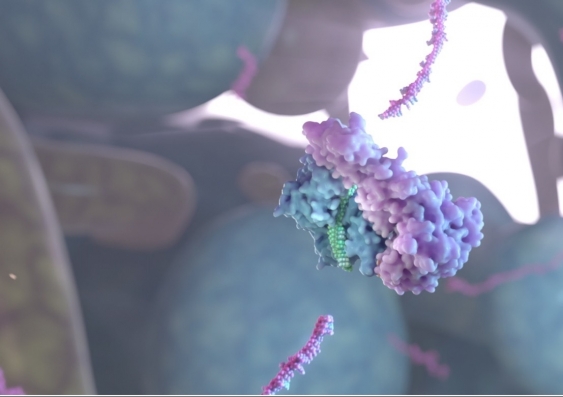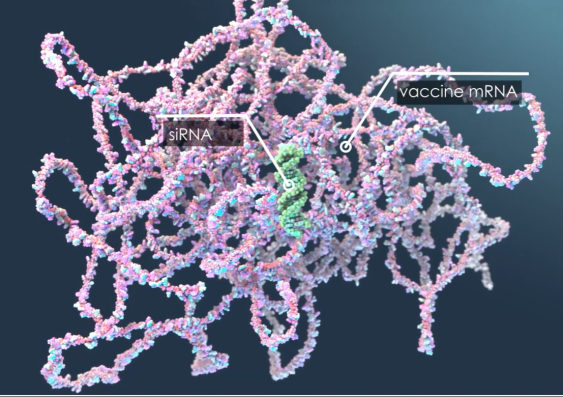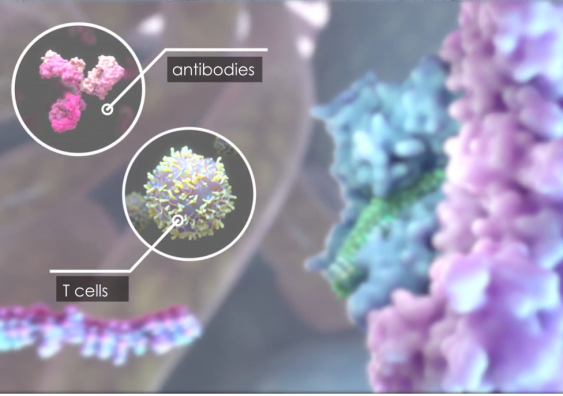Universal siRNA COVID-19 treatment shows promise in the lab
If proven effective in future clinical trials, these therapeutics will be a key tool in the fight against COVID-19.
If proven effective in future clinical trials, these therapeutics will be a key tool in the fight against COVID-19.

Lab data in cells has shown that siRNA has the potential to treat COVID-19 infection better than existing antivirals, according to new research from UNSW’s Kirby and RNA Institutes, published today in Antiviral Research.
siRNA – which stands for short interfering RNA – are a tiny type of RNA, much smaller than the mRNA currently used in vaccines. They work by interfering and disrupting the protein production of a gene, including those from viruses.
In the lab, Dr Chantelle Ahlenstiel and her team from the Kirby Institute have been using cell lines to test how effectively siRNA therapeutics can stop SARS-CoV-2 from replicating.
“Our research shows that siRNA treatment can target the virus in key regions that do not change as the virus evolves, which means it works across all current variants of concern. Most importantly, we envisage that it will also work for existing and future SARS coronaviruses that emerge,” she says.
The publication shows that siRNA treatment reduces virus levels up to 99.9 per cent for all variants of concern, and is more potent than Sotrovimab and Remdesivir.
“siRNA can stop SARS-CoV-2 replication by directly targeting the virus itself, which means there is no immune system involvement, so a recipient doesn’t need a functioning immune system for the treatment to work. This will make siRNA a really important treatment option for people with impaired immunity,” Dr Ahlenstiel says.

siRNA is much smaller than the mRNA used in vaccines. Image: UNSW Sydney
With funds from the Medical Research Future Fund, the siRNA therapeutic is now being combined with lipid nanoparticles, such as those that deliver mRNA vaccines, and the researchers are developing it for respiratory administration, to allow for targeted and easy treatment delivery. This involves an exciting first for Australia by partnering with the international company, Medspray, who is leading the way in innovative spray nozzle design.
Professor Pall Thordarson, Director UNSW’s RNA Institute, says the next step is to optimise and assess the siRNA treatment in pre-clinical studies in mouse models.
“At the RNA Institute we are excited by this partnership, and proud to be providing large scale siRNAs for these studies. We anticipate that the effective RNA therapeutic candidates will progress to early phase clinical trials,” said Prof Thordarson.

The siRNA seeks cells where the virus lives, without the help of antibodies or T cells from the immune system. Image: UNSW Sydney
The rapid development of vaccines and treatments for COVID-19 has been one of the most significant scientist achievements of human history.
But the existing treatments do not work well for everyone. Monoclonal treatments need to be re-developed as variants emerge and repurposed antiviral therapies have side-effects – and they have complex drug interactions and need to be taken within five days of symptoms to be effective.
“People are still getting sick and dying from COVID-19,” says Professor Anthony Kelleher, Director of the Kirby Institute and co-senior author on the paper. “There is an urgent need to develop long-term, sustainable, easily accessible antiviral solutions that target SARS-CoV-2, and that are resistant to mutations in the virus over time.
“A very exciting promise of siRNA is that it has the potential to be a treatment option available prior to the emergence of new variants, keeping us one step ahead of this ever-changing virus.”
However, the treatment described in the latest publication by Dr Ahlenstiel is still currently in the pre-clinical phase and requires assessment in clinical trials.
“We’re hopeful that in a few years the siRNAs will be available as an easy and effective treatment option, allowing all of us, and in particular people who are immunocompromised, to live with COVID-19,” she says.